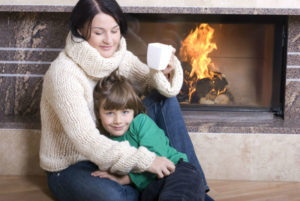Power outages bring many inconveniences, but during cold-weather months, a power outage can be downright dangerous.
When the power goes out during the dead of winter, particular if it’s out for a long period of time, heating your home can become a major concern. Your home-heating appliances can become vital during a power outage to keep your family warm and your home safe from problems such as frozen pipes. Having a fireplace, stove or heater installed in one room of your home can ensure that your family will be safe and warm during a winter power outage.
Fireplaces
While traditional fireplaces tend to be the least efficient way to heat your home, they can be a useful source of heat during a power outage. Even modern fireplaces that depend on electric blowers to produce heat more efficiently can help to keep your family warm during a power outage. If you have a wood-burning fireplace and an ample amount of wood on hand, your fireplace can provide your family with some warmth during a power outage. Natural gas generally will continue to work during a power outage, and many newer gas fireplaces include battery backups to light the fireplace in the event of a power outage.
Heating stoves
Stoves – whether they burn pellets, wood or gas – can be a great source of heat during a power outage. While many stoves include blowers to expel more heat, they will still work to heat your room without the blowers during a power outage. The major advantage to stoves during power outages is that they put out heat from all sides, heating more of your room than a fireplace would. Because heating stoves include chimneys or vents outside, they are one of the safest ways to heat your home during a power outage.
Ventless gas stoves
For rooms in your home that don’t have easy access to the outside, ventless gas stoves can provide a good heating option. As with other stoves, they will operate during a power outage and provide an ample amount of heat for your room without requiring a chimney and duct work. While older models of ventless gas stoves were viewed with caution because they do put out some gases into a room, newer ventless stoves include sensors and automatic shutoffs the oxygen level drops too low.
Heating safety
Regardless of how you are heating your home during an emergency power outage, there are several precautions you should take. Your heating appliance should not be left unattended, and any flammable materials should be kept far away. Your home should be outfitted with battery-operated carbon monoxide detectors, and a fire extinguisher should be nearby.
The key to keeping your home warm during a power outage is preparation. Talk to a home-heating expert to see what appliance would best serve your needs, both on a regular basis and in the event of an emergency.



